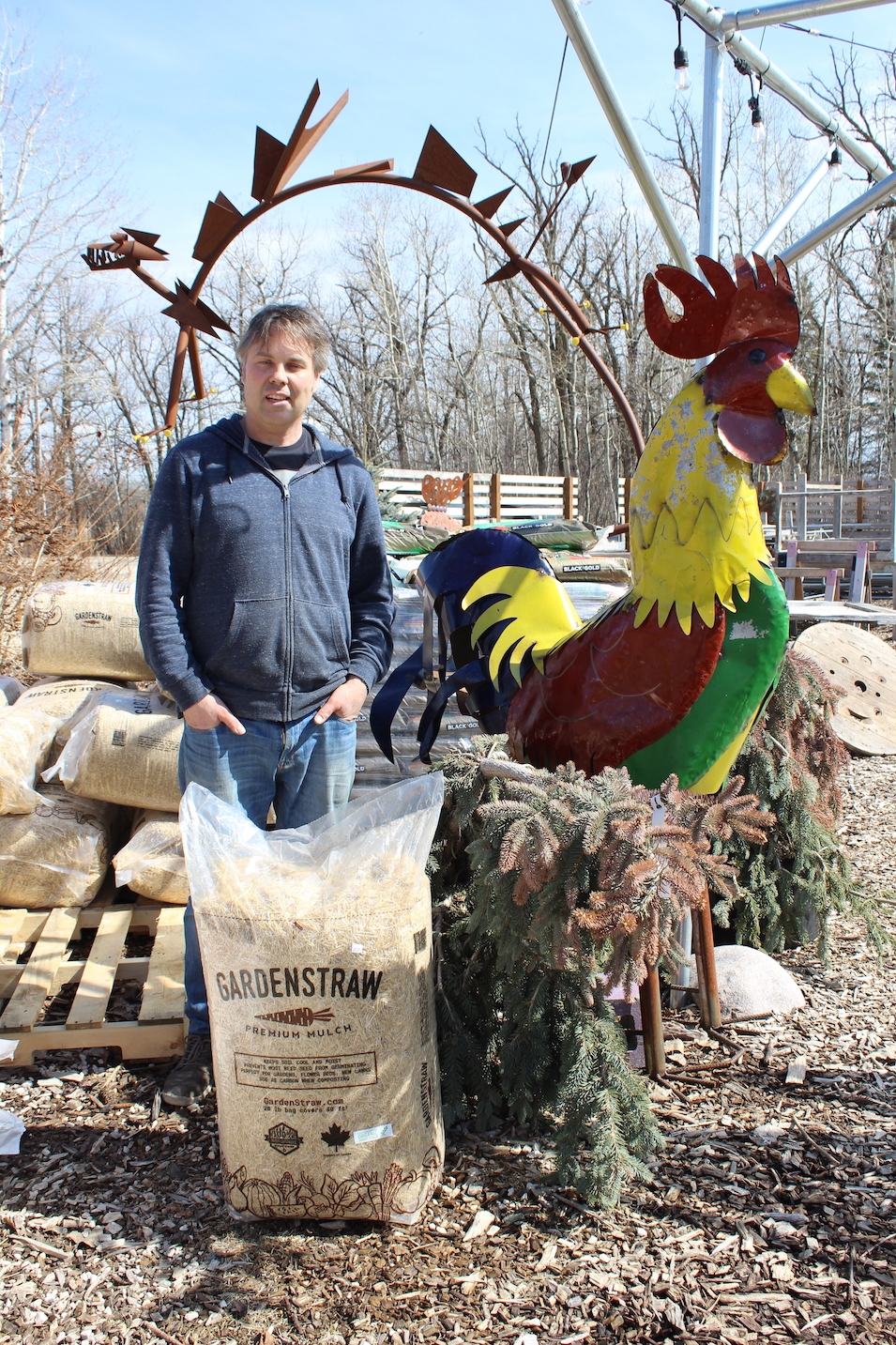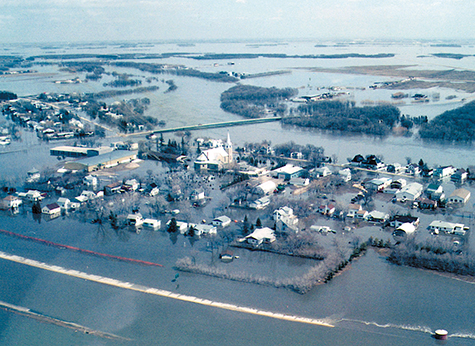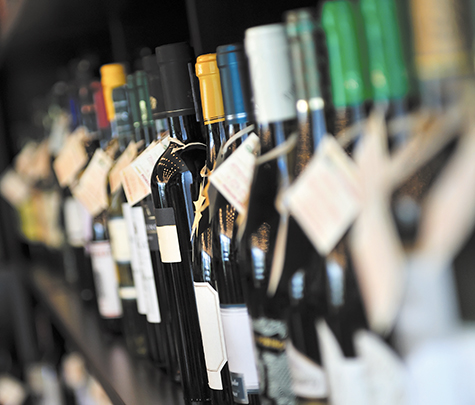
Whether it boils down to our kids or pets, the natural ecosystem or the environment, more and more people are looking for ways to create chemical-free outdoor spaces to live in. And with court cases arising over the prolific use of popular weedkillers, it begs us to question the safety of these toxic chemicals and look for natural alternatives, for the sake of our health and that of the planet’s.
Dave Hanson is the owner of Sage Garden on St. Mary’s Road in south Winnipeg. For the past 25 years, Hanson has dedicated himself to helping people create sustainable and natural gardens and lawns. He’s also a garden educator, author, and columnist for a popular CBC Radio Manitoba gardening call-in show.
As a steward of the environment, Hanson has worked hard to provide his customers with locally made organic solutions in every corner of his full-service nursery.
“There’s a lot of eco-solutions that are not only smart but they make life better for the gardener,” Hanson says. He speaks to the many ingenious fully organic products cropping up on the market due to public demand.
Plants
But it’s not just about the products for Hanson; it’s about the plants. Sage Garden grows all of their retail plants in 100 percent certified organic soil.
“We go out of our way to source seeds and cuttings that are certified organic,” says Hanson. He doesn’t think other greenhouses in Manitoba can say that, and it’s important not only for plants that produce edibles but for ornamental plants as well. “Many types of seeds are treated [at the manufacturer level] with a wide variety of pesticides or herbicides that are right on the seeds themselves.”
When the plant grows, these chemicals remain in the plant, which can have an impact on bees, butterflies, and pets. As well, the ecosystem is made up of a huge variety of burrowing and flying creatures that are integral to the health of the entire system and are negatively impacted by the use of unnatural products.
Many nurseries use plant-cuttings which are shipped in from places around the world which have different regulations when it comes to spraying. Long-distance shipping, too, creates an impact on the environment. For this reason, Hanson and his team are very careful in sourcing their cuttings, seeds, and other products from reliable local sources whenever possible.
Weed and Pest Control
As for weed and pest control, Hanson encourages gardeners to grow with diversity, planting in such a way as to encourage the arrival of birds and bugs that take out the undesirable pests waiting to eat our garden produce and plants.
Many people tend to forget, he says, that applying chemicals to fight one insect or bug will harm them all, including the birds that come to perch.
Fertilizer
A variety of natural garden, lawn, and flower pot products fill the Sage Garden shelves. Hanson’s top pick for 2019 is Wild Farms Valley wool pellets, a product that is perfect for flower baskets and planters and will be used in every one of Sage Gardens hanging baskets on sale this year.
“It has very good slow-release fertilizer qualities about it,” Hanson says. “There’s two aspects to it: lanolin, which breaks down very quickly so your plants get a quick boost, and then the rest of the wool breaks down over about six months.”
He adds that it provides a great source of nitrogen and has excellent water retention capabilities, meaning hanging baskets don’t need to be watered as often.
Compost
For garden beds and lawns, everything starts with nutrient-rich soil and compost. In our clay-heavy Manitoba soil, it’s difficult to achieve a good balance without additives. If the weather is wet, the clay soil is soppy. And if it’s dry, the soil becomes hard and cracked.
Sea soil is a high-quality compost made of fish products and forest waste. For lawns that experience patches of winter kill, sea soil can be spread on top. It also provides a more conducive growing surface before spreading new seed. Hanson says that most regular top soils ordered from soil companies in Manitoba are sourced from agricultural land which isn’t organic. He suggests adding organic materials to assist in balancing the soil.
Sea soil and worm castings are excellent compost additives for flower planters when coupled with an organic soil mix, all available at Sage Garden.
Garden Straw is Hanson’s top pick of 2018 and continues to be a favourite this year. The organic straw, sourced from Blumenort, Manitoba, is ideal for garden beds with its water-retentive and weed-suppressing qualities. “Conventional straw from farmers’ fields is known to contain herbicide residue that can actually cause your [plants] to fail if you mulch with it,” Hanson warns.
One bag of Garden Straw covers 30 square feet of garden space, which makes it an extremely affordable mulch product. Last summer, Hanson experimented with planting potatoes inside pots filled mostly with Garden Straw.
“Potatoes need very little in the way of soil,” Hanson says. “They need phosphorous, so you could add bone meal, put some compost in so you have nitrogen, and other than that you’ve got some good space to grow.”
The other benefits, he says, is that straw provides an environment that deters weeds and potato beetles and, at the end of the season, the potatoes are completely free of mud and dirt.
Lawns
Eco-Lawn grass seed is a unique product made by Wildflower Farms in Ontario and is becoming sought after by golf courses around the country. Most regular turf-grasses are laterally rooted, so their roots are shallow, making them more susceptible to browning and die-off in high temperatures. Eco-Lawn grass seed develops vertical roots that sink nine inches into the soil.
Deeply rooted grass is drought-resistant, requiring less watering since the roots can grab moisture and nutrients from deeper in the soil. Eco-Lawn grows more slowly than traditional grass, too, requiring less mowing. It also grows well in both sun and shade and is hardy enough to grow in almost any kind of soil base.
“When it comes to organic lawn care, the idea of it is to try and overcome the idea of using herbicides to control weeds,” Hanson says. “Another one is trying to not use excessive fertilizer on the lawn because that can have negative effects with fertilizer that ends up in the waterways. It can also cause several disease problems in your lawn if you’re over-fertilizing.”
Sage Garden carries a variety of natural fertilizers from the Evolve line of products made in Stonewall, Manitoba. Hanson says they are affordable and easy to apply. Other lawn products include corn gluten, which is high in nitrogen and free of phosphorous and potassium, and clover, which provides a comfortable, cushiony feel to a lawn and, when mowed regularly, blends right in, leaving it barely distinguishable from regular grass. Clover is a natural weed suppressant and provides an excellent source of nectar for bees.
“Bees, of course, are foundational to how pollination takes place,” Hanson says. “Fruit crops and vegetable crops are dependent on bees for healthy development… So if we have spaces that are short on bees, then we tend to have poorer success with those things… Paying attention to the bees is vital to ongoing success as people on earth.”
Sea Minerals
Sea Minerals FA is an all-natural mineral product derived from the sea. It contains up to 95 different minerals which help get the microbes within soils working again, making for healthier lawns, gardens, flowers, trees, shrubs, and household plants.
Rex and Nancy Pettyjohn of Pine River, Manitoba were the first to bring this unique product to the Canadian market.
“We have a ranch in Missouri with our son Kerry and we have to fertilize,” says Nancy. “Rex found an article in [a] cattle magazine about Sea Minerals FA, and it was cheaper than regular fertilizer, so we thought, ‘What do we have to lose? We might as well try it.’ Two months later, our son called and told us what it had done. There were less weeds, we had no Canada thistle, and the grass came back. The cows just love that area to graze [now]. So we got [in touch with] the CEO of the company in Arkansas and bought a semitruck load and brought it to Canada.”
The product is easy to use by simply dissolving the sea minerals in water and spraying it directly onto a plant’s foliage. The minerals absorb into the plant, assisting its growth, and move down into the soil, providing much-needed mineral support.
The couple has seen astounding results on their own yard and on those of their clients, including reversing winter kill on lawns and cedars. Potted plants and gardens grow more prolifically with healthier, larger blossoms and fruit. It also neutralizes pet urine.



















